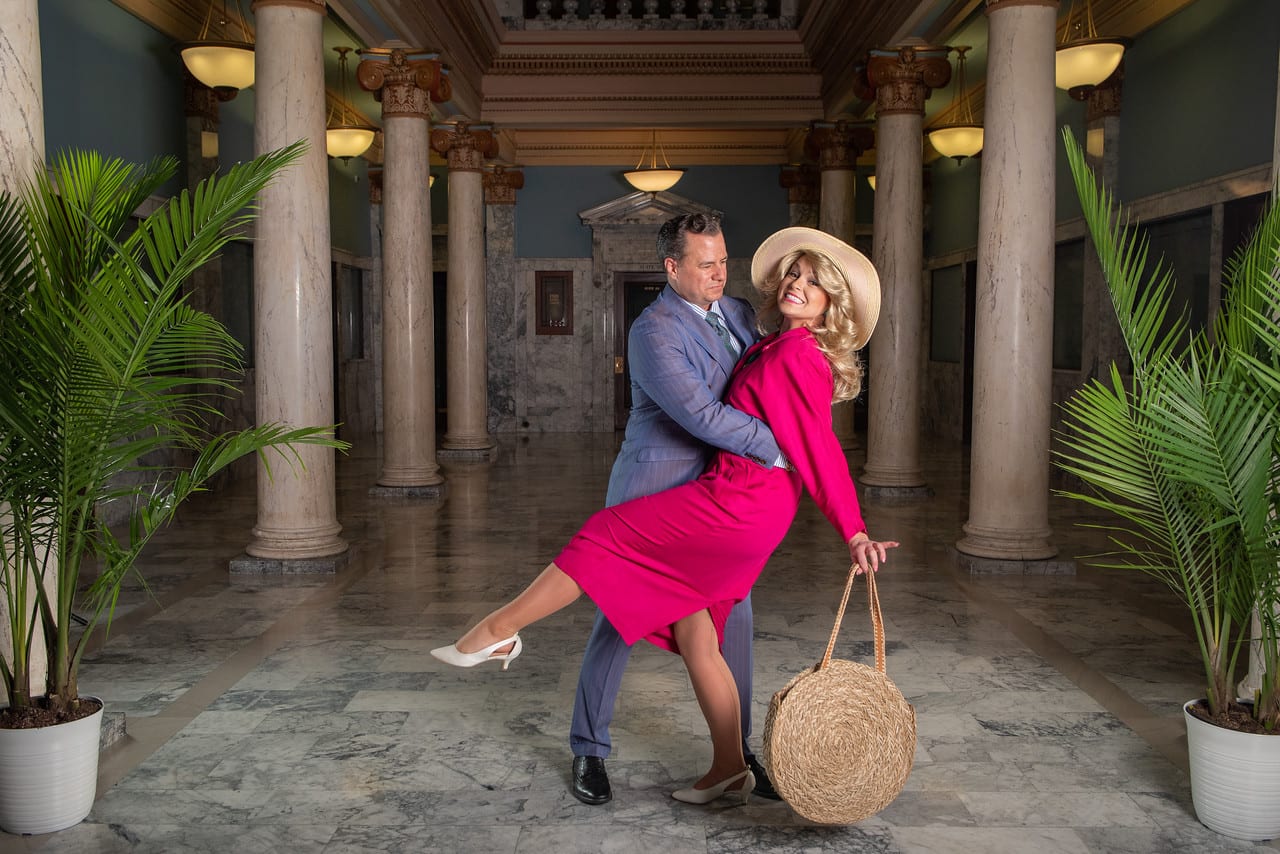OREM — According to Dirty Rotten Scoundrels, the key to being a good con artist is to “Give them what they want.” The producers at Hale Center Theater Orem have taken this advice to heart to give their audience an escape from the monotony of the COVID-10 pandemic.

Based on the 1988 film of the same name, Dirty Rotten Scoundrels tells the story of a faceoff between two criminals, the debonair Lawrence Jameson and the loutish Freddy Benson, who compete with one another to con $50,000 from their mark: the American “soap queen” Christine Colgate. In addition to musicalizing the film, the script (by Jeffrey Lane) adds a subplot in which police officer André Thibauly and Lawrence’s former victim, Muriel Eubanks, fall in love.
David Morgan directs this production with his usual efficiency. The show clips along well, and the complex scenes in the first act have a swift flow to them that gives the audience the same dizzying experience as one of Lawrence’s female marks who is swept off her feet. Morgan also added visual humor to breathe life into the show’s mechanical script.
Blake Barlow played Lawrence Jameson suavely and with the confidence that the character must exude. Barlow is comfortable on stage throughout the show, whether he is dancing a swift tango or insulting Freddy’s boorish manners. The main drawback to Barlow’s performance is his poor command of his accents; the character is supposed to be British (though pretending to be Austrian for most of the second act), but Barlow’s speech patterns switched between generic European to British to American, sometimes within the same scene.
As Freddy Benson, Peter Lambert was the platonic ideal of a classless American lout. Lambert seems to enjoy the role, and there was a genuine glee in his eyes as Freddy defended his tactics to Lawrence or told a sob story to Christine.
As Christine Colgate, Kelly Coombs is the anchor of the show; she gives Freddy and Lawrence something tangible to fight over and is the focus of the men’s attention in all her scenes. Coombs handles the role effortlessly because she is an energetic dynamo with pizazz to spare. Those characteristics serve her well when she and Lambert share the show’s most vocally powerful moment in “Love is My Legs.” Unfortunately, Lane’s script does not introduce the character until the first act is nearly over, which makes the first hour or so lack focus.
Indeed, the main drawback with the leading actors is that the script does not give them much variety in their roles. Christine mostly listens and reacts to Freddy and Lawrence, only taking the initiative in her final two or three scenes. Lawrence mostly paces around the stage with an air of superiority as an upper class gentleman who happens to engage in a life of crime. Freddy is a comic foil and a stereotype instead of a real character; the only variety he gets is when he pretends to be “Ruprecht,” Lawrence’s brother with an intellectual disability. While eschewing realism, this scene is distasteful in the way it makes light of the behaviors of people with intellectual disabilities.
David Yazbek‘s score is better than the script deserves, yet still lacking. Songs are only memorable when they can showcase Jennifer Hill Barlow‘s fabulous choreography (as in “Oklahoma?” and “The More We Dance”). “Great Big Stuff” has some clever lyrics, but reveals nothing about Freddy’s character or motivation after the first line or two. “Here I Am” gives Christine a very theatrical entrance but lacks focus as it shifts from Christine to her reactions to the hotel.
Ironically, the actors who are best able to show off the range of their talents are in the ensemble. Consisting of four men (Zack Elzey, Dallin Bradford, Ismael Arrieta, and Jeffrey Sundwall) and four women (Kennedy Johnson Bradford, Reese Riley, Abreá Ascione, and Hailey Bennett Sundwall), this ensemble clocks in almost as much stage time as the leads. All eight play a vast array characters, including rowdy dancing cowboys, the staff at an elite hotel, nightclub denizens, and more. They brought variety and endless talent to their performances and were the glue that held the show together.
Thanks to costume designer Peter Terry, the actors all looked like they stepped out of the 1980s. The shoulder pads, the women’s long jackets paired with short skirts, the neon colors on a windbreaker, the puffy sleeves on a dress, the rolled up suit sleeves on men’s suit jackets, and many other fashion highlights of the era were all on display in their full glory. What I appreciated most was that these costume design choices were sincere; this production did not mock the ’80s (like Xanadu). Instead, characters wore these costumes because the clothes fit in with the time and setting of the play’s action and grounded the show in a historical reality.
So, does Dirty Rotten Scoundrels “given them what they want”? For audience members who just want an enjoyable evening out where they can bask in the performances of some talented local actors, the answer is an unambiguous “yes.” But Dirty Rotten Scoundrels is not one of the great American musicals, and much of the show suffers from the unfocused script and uninspiring score. With the right expectations, though, audience members can attend it and enjoyed being played by Freddy, Lawrence, and the rest of the gang.
[box]Dirty Rotten Scoundrels plays nightly (except Sundays) at 7:30 PM and 4 PM on Saturdays through April 10, with additional matinees at noon on Saturdays, starting on March 27 at Hale Center Theater Orem (225 West 400 North, Orem). Tickets are $22-30. For more information, visit www.haletheater.org.[/box]

